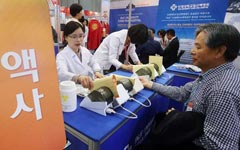Yang's friends and relatives had also encountered difficulties in seeing doctors because of the high demand for and short supply of healthcare services in China. It helped to prompt Yang to join Concord Medical Services as an investor and as its CEO.
Yang now spends all his time on the job, even at weekends. If he is not on a business trip, he likes to be at the office. He enjoys exercise, mostly running.
As a professional manager, Yang learned about healthcare and what it could achieve through his job. He also undertook courses in healthcare management at Yale University.
|
 |
|
 |
In 2008, China released a rule regulating large medical equipment imports. Meanwhile, hospitals were becoming richer and the price of large equipment was decreasing. Consequently, Concord Medical Services' leasing business was facing a challenge. It was in 2011 that the Chinese government allowed foreign companies to set up independent healthcare institutions. Yang said it was good for them to transfer the business from leasing to operational work at hospitals.
"China has a large number of cancer patients and the number is increasingly large. The medical resources in the public hospitals are so limited that patients cannot obtain multidisciplinary treatment solutions to cure their illness in the best way," said Yang.
Cancer was the leading cause of death in 2012 in China when 2.7 million people died from it, accounting for 13 percent of total deaths that year, according to the National Center for Cancer Registration. An aging population, urbanization and tobacco usage, environmental pollution, food contaminants and a high-pressure lifestyle have also contributed to the high rates of cancer in China.
The Chinese radiotherapy market is growing fast. The market size would is expected to total 48.5 billion yuan in 2015, against 16.2 billion yuan in 2008, according to Concord Medical Services' research.
There are three ways - surgery, chemotherapy and radiotherapy - to treat cancer.
In the United States, an oncology patient will be diagnosed by doctors from the three departments together and obtain a multidisciplinary diagnosis and treatment solution.
